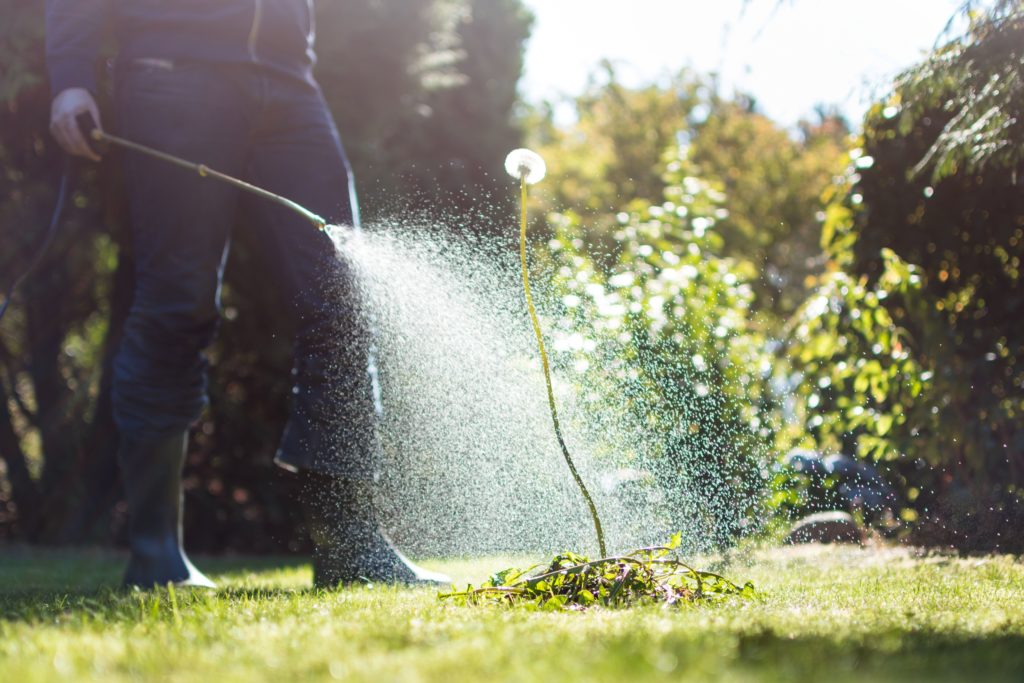Many homeowners use chemicals that feed grass and kill weeds and bugs. These chemicals are specifically designed to be lethal, so you need to take safety measures to protect yourself, your family, your pets and your neighbors whenever you’re treating your lawn or garden.

When used correctly, lawn chemicals do not pose any serious harm. Knowing how to apply, handle and store them correctly can help deter pests and keep your family safe.
Read labels
Before you use a pesticide, read the label. Labels offer detailed instructions on how to safely use and store the product, including what to do in the event of a spill or poisoning. Reading the label helps you understand the risks before you handle the product.
Prevent kids and pets from accessing affected areas
If handled or stored incorrectly, lawn chemicals can poison people or pets.
Pesticides are more toxic than fertilizers and herbicides, so they pose the greatest risk to children and pets. Once applied, these chemicals can be introduced into your home on shoes or clothing. If you have a toddler or infant crawling around, they can easily ingest pesticides tracked onto carpet.
To prevent pesticides from being tracked into your home, keep your children and pets away from the affected area. The label will specify when it is safe to reenter your yard,
Protect your hands and eyes
Protect your hands with gloves and your eyes with goggles. Many of these chemicals come in powder or pellet form, which can be carried to the skin and eyes by even the slightest breeze. Powders that you mix with water and spray can also create overspray or blowback, so personal protective equipment is essential.
Keep a separate set of tools and bottles for pesticides
Use a separate set of tools and bottles to mix and apply pesticides. These may include measuring spoons, cups and stirring paddles. Use plastic or metal, not glass or wood.
Handle pesticides with precision
Open and mix pesticides in a well-ventilated area. Mix only the amount you need, and use all that you mix.
Don’t apply pesticides when it is windy, and don’t spray them overhead, such as when you’re treating tree branches, eaves or ceilings.
Clean up
Discard pesticide containers according to the manufacturer’s directions. Household pesticide containers usually can’t be recycled. Do not burn, incinerate or puncture aerosol containers.
Then, shower and wash your clothes.
Follow these tips from the National Pesticide Information Center on how to clean clothes after working with pesticides:
- Remove your clothing and place it in a plastic bag outside your home until you are ready to wash it.
- Wear gloves when handling the clothing.
- Isolate the clothing from other laundry and wash in a separate load on hot with heavy-duty detergent.
- If a garment has been saturated with pesticide, discard it. Do not attempt to wash out the pesticide.
- Dry the clothing on a line. Sunlight can break down any pesticide residue.
Clearly label pesticides
Never reuse an empty pesticide container or store leftovers in another container. A child may mistake it for a drink.
Store pesticides in a well-ventilated area away from flammables
Keep pesticides away from paints, solvents and fuels, especially gasoline. Store liquid pesticides on a nonabsorbent surface or place them in a plastic tray or pan. This will keep them organized, prevent them from falling and breaking, and catch leaks. When you open a new container, note the date on the outside with a permanent marker.
Store products where pets and children cannot get to them, such as on a high shelf or in a locked storage shed. Just make sure the area is well-ventilated.
By reading labels and using products correctly, you can have a nice, pest-free lawn — and your health.
